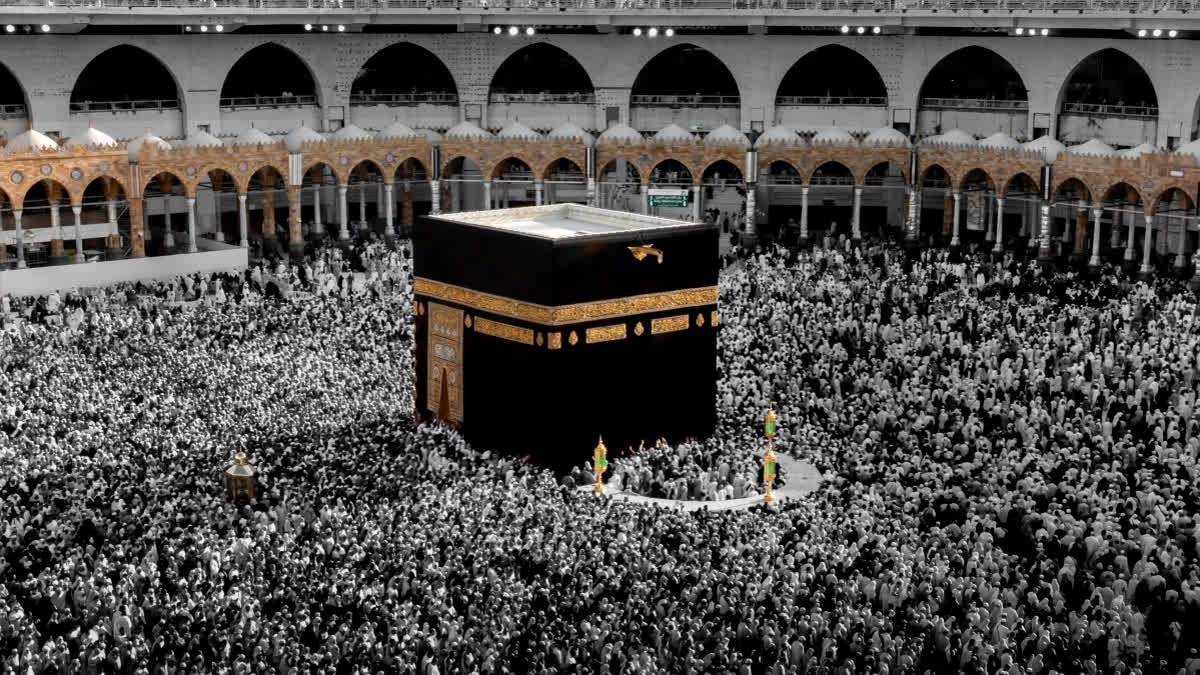New Delhi : With just a few days remaining for the Haj pilgrimage which is scheduled to take place on June 14 with Eid Al Adha falling two days later, a look at India's role in facilitating and supporting Indian Haj pilgrims, ensuring smooth pilgrimage experience.
In light of recent allegations of mismanagement concerning some Indian Haj pilgrims, the Indian Haj Pilgrims Office has taken proactive measures to address the issue. Officials of the Indian Haj Mission are actively collaborating with Saudi Arabian authorities and ensuring that all necessary assistance is provided to the pilgrims.
"Officials of the Indian Haj Mission are coordinating with concerned Saudi authorities, who are investigating this matter. All necessary assistance is also being provided to the Indian Haj pilgrims," Indian Haj Pilgrims Office posted on X.
"The Indian Haj Mission works to support and serve Indian Haj pilgrims and the Indian community. It is the biggest operation of its kind handled by the Government of India outside the Indian borders", according to its X handle.
However, for 2024, India has been steadfast in undertaking several measures to facilitate and support Indian Haj pilgrims, ensuring a smooth and spiritually fulfilling pilgrimage experience. According to the sources, India has successfully negotiated an increased quota for Haj pilgrims with Saudi Arabia. For 2024, the quota has been increased, allowing more Indian Muslims to participate in the pilgrimage. According to the Ministry of External Affairs, this year, a total of 175,025 Indian pilgrims will visit Saudi Arabia under the 2024 Hajj quota.
Bilateral Agreements: India and Saudi Arabia have signed agreements to streamline the Haj process. These agreements cover various aspects such as visa issuance, accommodation, and transportation.
Streamlined Application Process: Online Application System: The Haj Committee of India has continued to improve the online application system, making it more user-friendly and accessible. Applicants can easily fill out forms, upload necessary documents, and track their application status online.
Digital Payment: Payment for the pilgrimage can be made digitally, reducing the need for physical bank visits and simplifying the payment process.
Accommodation: The Indian government has worked with Saudi authorities to secure better accommodation facilities for Indian pilgrims. Efforts have been made to ensure that lodging is close to the holy sites and equipped with necessary amenities.
Medical Services: Comprehensive medical facilities are being arranged for the pilgrims. This includes setting up medical camps with doctors, nurses, and necessary medical supplies in Makkah, Madinah, and other locations frequented by pilgrims.
Transportation: Efficient transportation services are being provided to ensure that pilgrims can move easily between their accommodations and the holy sites. Special buses and shuttle services are organized for this purpose.
Orientation Programs: Pre-departure orientation programs are conducted to educate pilgrims about the rituals of Hajj, cultural practices in Saudi Arabia, and health and safety guidelines. These programs help pilgrims prepare mentally and physically for the journey.
haj Mobile App: The Haj Committee of India has enhanced its mobile app to provide real-time information, updates, and guidance to pilgrims. The app includes features like prayer timings, route maps, emergency contact numbers, and more.
E-MASIHA (E-Medical Assistance System for Indian Hajis Abroad): This digital health application helps manage and monitor the health of pilgrims. It stores medical histories and provides access to healthcare professionals during the pilgrimage.
Affordability: The government is working to keep the pilgrimage affordable. Efforts include negotiating better rates for flights, accommodation, and other services.
Embassy Support: The Indian Embassy and Consulates in Saudi Arabia are actively involved in assisting pilgrims. Dedicated teams are deployed to provide on-ground support and handle emergencies. Offices are set up in key locations in Saudi Arabia to coordinate activities and provide assistance to pilgrims.
During his official visit to Saudi Arabia in May, Muktesh K Pardeshi, Secretary of the Ministry of External Affairs (MEA), actively assessed the arrangements for the Haj 2024 pilgrimage. He engaged in productive discussions with several ministers from Saudi Arabia to enhance collaboration between the two nations. Notably, this year, Indian pilgrims embarking on the Haj will experience a more convenient and efficient journey as they will be able to access high-speed trains from Jeddah airport to Makkah for the first time, effectively reducing travel time by half.
What is Haj? Haj is an annual Islamic pilgrimage to Mecca, Saudi Arabia, and it is one of the Five Pillars of Islam, which are the core practices required of Muslims. Haj is one of the five essential acts of worship in Islam, along with the declaration of faith (Shahada), prayer (Salat), fasting during Ramadan (Sawm), and almsgiving (Zakat). It is obligatory for every adult Muslim who is physically and financially capable of undertaking the journey at least once in their lifetime. The rituals of Hajj commemorate events in the life of the Prophet Abraham (Ibrahim) and his family, particularly the willingness of Abraham to sacrifice his son as an act of obedience to God, and God’s provision of a ram to sacrifice instead.
The rites performed during Hajj were established by the Prophet Muhammad during his "Farewell Pilgrimage" in 632 CE. The pilgrimage takes place annually during the Islamic month of Dhu al-Hijjah. Haj serves as a powerful symbol of unity and equality among Muslims. Pilgrims from diverse backgrounds and nationalities gather in Mecca, wearing the same simple clothing and performing the same rituals. The pilgrimage is a time for Muslims to seek forgiveness, renew their faith, and make a fresh start in their spiritual lives.
Modern Haj involves extensive logistical arrangements, including travel, accommodation, healthcare, and security. The Saudi government, along with the governments of various countries, especially India coordinates these services to manage the large influx of pilgrims.
Haj is a profound spiritual journey that emphasizes the principles of sacrifice, humility, and unity in the Islamic faith. It is a time of intense devotion, reflection, and communal solidarity for millions of Muslims around the world.



